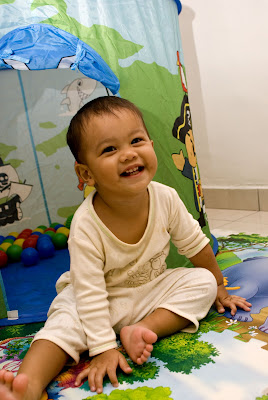Highlights
New this month: Self-control — or lack thereofWhat you can doOther developments: Taming temper tantrumsNew this month: Self-control — or lack thereof
What would the world be like if we all acted on every impulse? If adults had no self-control? Observe a couple of 17-month-olds and in no time you'll have some idea: chaos. Children aren't born with self-control, so when your toddler is hungry, he wants to eat ... immediately. When he wants the toy his friend is playing with, he wants it ... right now! He doesn't understand that screaming won't make the food come any sooner (even though this method worked when he was a newborn), or that forcefully grabbing a toy is going to upset his playmate.
What you can do
Since toddlers want what they want when they want it (passionately!), explaining the consequences of their actions won't give you immediate results. But go ahead and try. Explaining things in a reassuring voice is good practice for the future and if you do it with lots of affection and physical contact, you'll make it easier for your toddler to stay calm when he needs to wait a little bit or cooperate with you.
Though it may seem impossible at times, if you are warm and patient when your toddler is most trying, you may find that he's more willing to settle down. Try to show your happiness when your toddler cooperates and complies with your requests, but be prepared to remove him from the situation if he won't.
Other developments: Taming temper tantrums
Quick! What's the quickest way to stop a tantrum? Cave in to your toddler's demands, right? Now, what's the best way to guarantee that the tantrums will continue? Same thing. If you reward your child for "stopping" his tantrum, he'll figure it out pretty quickly. And he'll have tantrums just so he can get what he wants. But if you simply ignore the tantrum, which may be difficult to do sometimes, he'll learn just as quickly that this behavior doesn't move you and he'll likely stop. If you're in a public place such as a restaurant or store, your best bet may be to leave with him until he calms down.
It may help you to deal with your toddler's tantrums if you understand what's behind them, at least in part. At 17 months a child may want to master stacking five blocks on top of one another. Or he's determined to put his own shoes on, to ride his older sister's bike, or to eat with a fork. When he can't, he may get frustrated. Tantrums are more likely to occur when your child is hungry, tired, or over-stimulated. Sometimes a tantrum is a plea for your attention: a reassuring hug and your undivided attention can make the storm clouds go away.
Tantrums aren't easy for parents. It can be hard to listen to a lot of crying, or to have your child be angry at you. But tantrums are a completely normal part of toddler development







